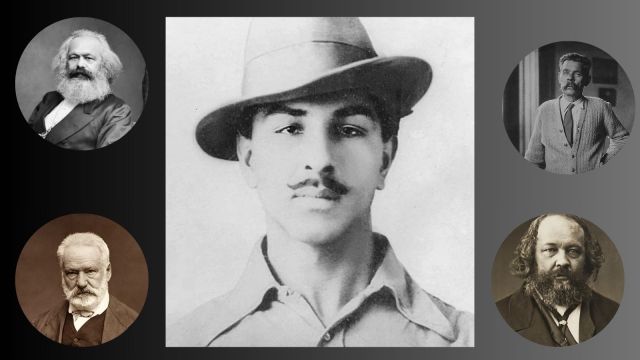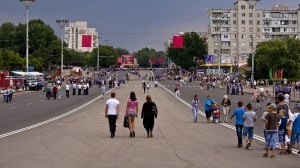Aishwarya Khosla is a journalist, currently serving as Deputy Copy Editor at The Indian Express. Her writings examine the interplay of culture, identity, and politics. She began her career at the Hindustan Times, where she covered books, theatre, culture, and the Punjabi diaspora. Her editorial expertise spans the Jammu and Kashmir, Himachal Pradesh, Chandigarh, Punjab and Online desks. She was the recipient of the The Nehru Fellowship in Politics and Elections, where she studied political campaigns, policy research, political strategy and communications for a year. She pens The Indian Express newsletter, Meanwhile, Back Home. Write to her at aishwaryakhosla.ak@gmail.com or aishwarya.khosla@indianexpress.com. You can follow her on Instagram: @ink_and_ideology, and X: @KhoslaAishwarya. ... Read More
How 5 writers – from Marx to Victor Hugo – shaped Bhagat Singh’s political thought
Independence Day Read: Some of the books Bhagat Singh thumbed through still survive today, their pages worn and underlined, holding the fingerprints of a young man who believed the pen could prepare the mind for the sword. Here are five of them, as recorded in the library’s own issue logs:
 Bhagat Singh was a voracious reader with a wide range of interests, particularly in politics, economics, and social issues.
Bhagat Singh was a voracious reader with a wide range of interests, particularly in politics, economics, and social issues.In the years before his execution, Bhagat Singh consumed books with the urgency of a man racing against time. The Dwarka Das Library in Lahore, later relocated to Lajpat Bhawan, was his intellectual arsenal. Among its 500-plus volumes on politics, history, and economics were the works that shaped his thought and sharpened his revolutionary vision. Some of these books survive today, their pages worn and underlined, holding the fingerprints of a young man who believed the pen could prepare the mind for the sword.
Here are five of them, as recorded in the library’s own issue logs:
1. Mother — Maxim Gorky
 Gorky draws from real events during the 1905 Russian Revolution, portraying the transformation of ordinary people into political activists. (Wikimedia Commons)
Gorky draws from real events during the 1905 Russian Revolution, portraying the transformation of ordinary people into political activists. (Wikimedia Commons)
Published in 1906, Mother is a socialist realist novel set in Tsarist Russia. It tells the story of Pelageya Nilovna, a working-class widow whose son becomes involved in the labor movement. Initially hesitant, she begins distributing revolutionary leaflets and supporting underground activities. Gorky draws from real events during the 1905 Russian Revolution, portraying the transformation of ordinary people into political activists. The book became a cornerstone of socialist literature, translated into dozens of languages and widely read in leftist circles. Its vivid depictions of factory life, political awakening, and collective struggle made it both a literary and political landmark of its era.
2. God and the State — Michael Bakunin
 The book, God and the State, remains a foundational text in anarchist philosophy. (Wikimedia Commons)
The book, God and the State, remains a foundational text in anarchist philosophy. (Wikimedia Commons)
Written in 1871 and published posthumously in 1882, God and the State is one of the most famous anarchist works of the 19th century. In it, Mikhail Bakunin attacks organised religion and centralised political authority, arguing that both serve to suppress human freedom. The text is known for its uncompromising defense of reason, science, and individual liberty, alongside its rejection of all hierarchies. The book remains a foundational text in anarchist philosophy. Its rhetorical force and sweeping critique of power structures have kept it in print for well over a century.
3. Les Misérables — Victor Hugo
 Victor Hugo’s Les Misérables unfolds against the backdrop of post-Revolutionary France. An illustration of Jean Valjean, under the alias Monsieur Madeleine, by Gustave Brion. (Wikimedia Commons)
Victor Hugo’s Les Misérables unfolds against the backdrop of post-Revolutionary France. An illustration of Jean Valjean, under the alias Monsieur Madeleine, by Gustave Brion. (Wikimedia Commons)
Victor Hugo’s monumental 1862 novel spans decades of French history, weaving together the lives of dozens of characters against the backdrop of post-Revolutionary France. At its heart are themes of justice, redemption, and the struggle of the poor. Jean Valjean’s journey from convict to benefactor, Inspector Javert’s relentless pursuit, and the students’ doomed uprising in Paris are among its most enduring episodes. Hugo also uses long historical and philosophical digressions, on topics from the Battle of Waterloo to the sewers of Paris, to build a panoramic portrait of a society in flux. Widely acclaimed, it remains one of the most translated and adapted novels in the world.
4. Career of a Nihilist — S Stepniak
 Stepniak’s narrative provides both a human portrait of its protagonists and an insider’s view of the tactics and risks of revolutionary movements. (Wikimedia Commons)
Stepniak’s narrative provides both a human portrait of its protagonists and an insider’s view of the tactics and risks of revolutionary movements. (Wikimedia Commons)
First published in 1889, Career of a Nihilist is a political novel by Sergey Stepniak-Kravchinsky, a Russian revolutionary and writer. Mixing autobiography with fiction, the book depicts the clandestine world of 19th-century Russian radicals: secret societies, political assassinations, and life on the run from the Tsar’s police. Stepniak’s narrative provides both a human portrait of its protagonists and an insider’s view of the tactics and risks of revolutionary movements. The work was part of a wave of European literature that brought the Russian “nihilist” and revolutionary to the attention of English-speaking audiences, shaping perceptions of political activism in Tsarist Russia.
5. The Civil War in France — Karl Marx
 The German cover of The Civil War in France, which is Karl Marx’s account of the Paris Commune. (Wikimedia Commons)
The German cover of The Civil War in France, which is Karl Marx’s account of the Paris Commune. (Wikimedia Commons)
Published in 1871, The Civil War in France is Karl Marx’s account of the Paris Commune, the radical socialist government that briefly ruled Paris from March to May 1871. Written as an address to the General Council of the International Workingmen’s Association, it praises the Commune as the first example of the working class seizing political power. Marx details its administrative reforms, such as replacing standing armies with citizen militias and instituting direct democratic control, while also analyzing the reasons for its defeat. The pamphlet became a seminal text in socialist political theory, influencing revolutionary movements worldwide.



- 01
- 02
- 03
- 04
- 05





























